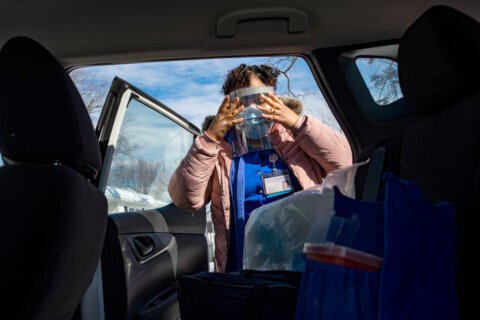After 29 years with Arlington County, Virginia, Police, Deputy Chief Andy Penn knows a concerning trend when he sees one. Just weeks before moving into the role of interim chief, Penn said addressing an uptick in deadly overdoses was an immediate focus.
As of Aug. 18, the county had lost 16 people to overdose deaths, according to Arlington County police data. A year ago, Arlington had just six fatal overdoses.

“One of the things that has been happening over the month of August is we’ve had six deaths we believe are related to opioid use. So, making sure that we’re putting enough effort toward mitigating that, education, response techniques, how do we involve different partner agencies,” Penn said of how to tackle the upward trend.
Penn spoke exclusively to WTOP about his approach to policing. He has spent his entire career with the Arlington police, starting as an overnight patrolman.
“This is certainly the greatest honor of my professional life,” Penn said, adding his appreciation for the leadership example set by his predecessor, Chief Jay Farr.
Last week, County Manager Mark Schwartz named Penn to replace Farr, who is retiring, and ending his 30-year career with the department after Labor Day. Penn currently commands the department’s operations division.
As interim chief, however, he’ll have to oversee an entire department facing a range of challenges, including recruiting new officers during a pandemic, the roll-out of a new body camera program in January, and day-to-day policing in a socially and politically charged climate following the death of George Floyd in Minneapolis police custody in late May.
“The initial challenge; we need to work our way through the dialogue. The things that are creating animosity or feelings toward law enforcement, we need to work toward having the open conversation, talking about, you know, different perspectives,” he said. “And I think this police-practices group is a great way to get into these conversations,” Penn said.
Schwartz convened a 15-member Police Practices Work Group group (PPG) in mid-July to review and report on current practices and policies following recent racial justice rallies across the country.
The group will work with facilitators to assess police policies in six key areas: use of force, training and supervision, cameras, recruitment and retention, internal affairs, and the analysis of data on arrests and stops over the past three years.
Schwartz said the group’s findings will influence the national search for a candidate who will be the best fit for Arlington.
“We’re anticipating community input will begin in October regarding [the] new Chief and that there will be no decision on final candidates until sometime after the work of the PPG is completed in December,” a spokesman for Schwartz’s office said in a statement.
The statement came after a question as to whether the national recruitment process would wait until after the group’s findings were released.
Penn expects there will be disagreement throughout the PPG’s term, but he said he is optimistic about finding resolution and perhaps improved policies from the recommendations.
“There’s a lot of things at play at one time. I think a lot of it centers around being open and transparent, willing to have the conversation and be at the table, even if we don’t agree, and [being] committed to making sure what we’re doing is best practice and if it’s not, make changes,” Penn said.








